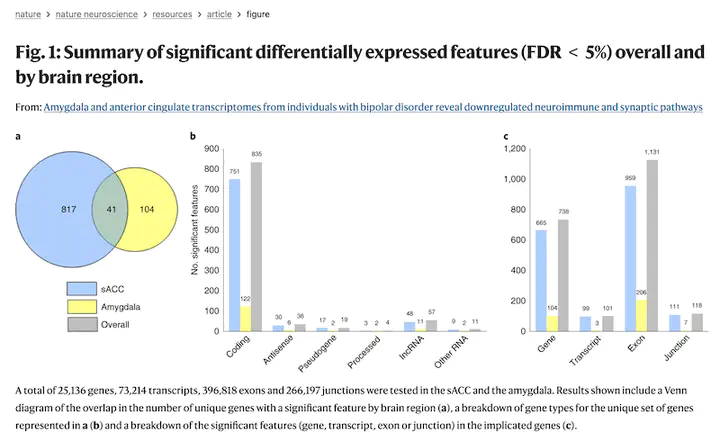Amygdala and anterior cingulate transcriptomes from individuals with bipolar disorder reveal downregulated neuroimmune and synaptic pathways
 Image credit: Nature Neuroscience
Image credit: Nature Neuroscience
Abstract
Recent genetic studies have identified variants associated with bipolar disorder (BD), but it remains unclear how brain gene expression is altered in BD and how genetic risk for BD may contribute to these alterations. Here, we obtained transcriptomes from subgenual anterior cingulate cortex and amygdala samples from post-mortem brains of individuals with BD and neurotypical controls, including 511 total samples from 295 unique donors. We examined differential gene expression between cases and controls and the transcriptional effects of BD-associated genetic variants. We found two coexpressed modules that were associated with transcriptional changes in BD: one enriched for immune and inflammatory genes and the other with genes related to the postsynaptic membrane. Over 50% of BD genome-wide significant loci contained significant expression quantitative trait loci (QTL) (eQTL), and these data converged on several individual genes, including SCN2A and GRIN2A. Thus, these data implicate specific genes and pathways that may contribute to the pathology of BD.
Zandi doesn't have an account here, so there's no Twitter 🧵 on a recent paper he led @jhugeneticepi @LieberInstitute#BipSeq: bulk #RNAseq from the amygdala & sACC🧠 from #bipolar disorder donors
— 🇲🇽 Leonardo Collado-Torres (@lcolladotor) May 1, 2022
💻https://t.co/t9JiL6CeJb
📢https://t.co/fjRIkrhsTn
📜https://t.co/dhdYaQtPLX https://t.co/K8F5gppBTj